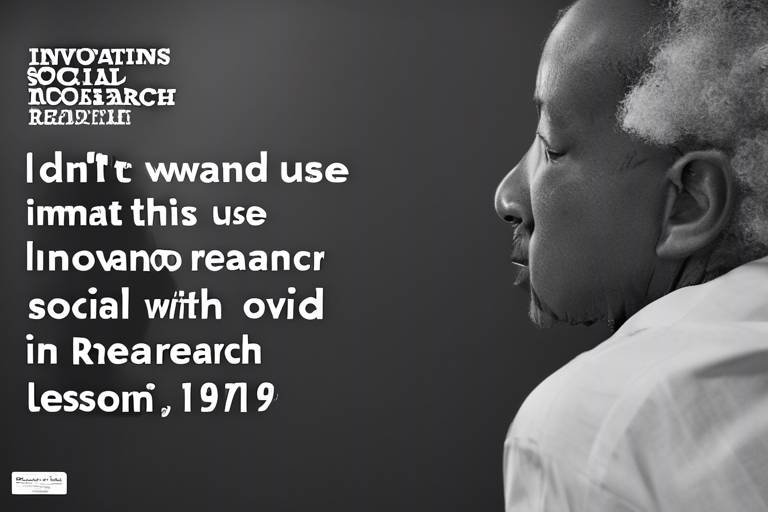Innovations in Social Research - Lessons from COVID-19
The COVID-19 pandemic has acted as a catalyst for transformation across various sectors, and social research is no exception. As researchers scrambled to adapt to a world turned upside down by lockdowns and social distancing, they discovered new methodologies, technologies, and insights that have reshaped the landscape of social inquiry. The urgency of the situation forced innovative thinking and rapid adaptation, which not only ensured the continuity of research but also enhanced the quality and depth of findings. This article delves into these innovations, illustrating how the lessons learned during this unprecedented time can guide future research practices.
With the onset of the pandemic, one of the most significant shifts in social research was the accelerated adoption of digital tools. Researchers quickly pivoted to online platforms, enabling them to reach participants remotely. This shift was not merely a stopgap measure; it opened up a world of possibilities for data collection. Virtual interviews, online surveys, and digital focus groups became the norm, allowing researchers to gather data efficiently while adhering to physical distancing measures. The flexibility of these methods not only ensured continuity but also expanded participant demographics, as geographical barriers were effectively removed. Researchers could now engage with diverse populations, enriching their studies with a broader range of perspectives.
As the research landscape transitioned online, it brought forth a host of new ethical dilemmas, particularly concerning data privacy. The necessity to rethink approaches to consent, data security, and participant confidentiality became paramount. In a digital environment, where information is easily shared and often misused, researchers must navigate these challenges with care. The importance of ethical considerations cannot be overstated, as the trust of participants hinges on the researchers' ability to safeguard their data and respect their privacy.
Obtaining informed consent in online research settings requires innovative strategies. It's not enough to simply present a consent form and hope participants understand their rights and the implications of their involvement. Researchers must ensure clarity and accessibility in their communication. This is increasingly vital in a remote context, where participants may feel disconnected from the research process. Clear explanations and engaging formats can enhance comprehension, ensuring that participants are fully informed before agreeing to take part in a study.
To effectively navigate the complexities of informed consent in virtual environments, establishing clear communication is crucial. Utilizing user-friendly consent forms that are easy to understand can significantly improve participant engagement. Researchers should consider the following best practices:
- Use simple language that avoids jargon.
- Incorporate visual aids to enhance understanding.
- Provide opportunities for participants to ask questions before consenting.
Verifying consent in a digital space presents unique challenges. Researchers must find reliable methods to authenticate participant identities while maintaining ethical standards. Traditional methods of verification may not be feasible in an online environment, necessitating the development of new techniques that ensure both security and integrity. This ongoing challenge highlights the need for continuous innovation in ethical research practices.
During the pandemic, social media platforms emerged as significant data sources, offering researchers unprecedented insights into public sentiment and behavior changes. The speed at which information spreads on these platforms can be both a boon and a bane. While researchers can gauge public reactions to health guidelines and policy changes in real time, they must also contend with the rampant spread of misinformation. This duality presents both opportunities and challenges, necessitating a nuanced approach to data collection and analysis.
The urgency of the pandemic fostered unprecedented collaboration among researchers, institutions, and communities. This collaborative spirit led to a more interdisciplinary approach to social research, allowing for a comprehensive understanding of complex societal issues. By pooling resources and expertise, researchers could tackle pressing challenges more effectively. The experience of working together during such a critical time has laid the groundwork for future partnerships that can address emerging societal challenges.
Engaging communities in research processes has proven essential during the pandemic. Researchers recognized the importance of ensuring that studies reflect the needs and experiences of those most affected by the crisis. By involving community members in the research design and implementation phases, researchers can gather more relevant and impactful data. This engagement fosters a sense of ownership among participants and enhances the overall validity of research findings.
Establishing trust with participants is vital for successful research outcomes, especially in sensitive contexts like a pandemic. Transparency and open communication play key roles in participant engagement. Researchers must convey their intentions clearly and demonstrate that they prioritize the well-being of participants. Building this trust not only enhances the quality of data collected but also promotes a more ethical research environment.
The lessons learned from COVID-19 will undoubtedly shape the future of social research. As researchers continue to integrate technology into their methodologies, they must remain vigilant about ethical standards and data privacy. The innovations sparked by the pandemic have the potential to address emerging societal challenges effectively, ensuring that social research remains relevant and impactful in a rapidly changing world. By embracing these lessons, researchers can pave the way for a more inclusive and responsive research landscape.
- How has COVID-19 changed social research methodologies?
COVID-19 accelerated the adoption of digital tools, allowing for remote data collection and broader participant engagement. - What are the ethical considerations in online research?
Researchers must prioritize data privacy, informed consent, and participant confidentiality in digital environments. - How can researchers build trust with participants?
Transparency, clear communication, and community engagement are essential for establishing trust. - What role does social media play in social research?
Social media serves as a valuable data source, providing insights into public sentiment and behavior changes. - What is the future of social research post-COVID-19?
The future will likely see continued integration of technology and a focus on ethical standards to address emerging challenges.

The Shift to Digital Research Methods
The COVID-19 pandemic has acted as a powerful catalyst for change in the realm of social research. As physical distancing measures took hold, researchers quickly recognized the need to pivot from traditional in-person methods to digital research tools. This shift was not merely a temporary adjustment; it marked a profound transformation in how data is collected and analyzed. With the world at a standstill, the ability to engage with participants remotely became essential, ensuring that critical research could continue despite the challenges posed by the pandemic.
Digital platforms such as video conferencing, online surveys, and social media have revolutionized the way researchers connect with participants. For instance, tools like Zoom and Microsoft Teams have become staples for conducting interviews and focus groups, allowing for real-time interaction while maintaining safety protocols. Meanwhile, online survey tools like SurveyMonkey and Google Forms have facilitated the collection of quantitative data, enabling researchers to gather insights from a broader audience without geographical constraints. This accessibility not only enhances participation rates but also enriches the data collected, providing a more comprehensive understanding of societal trends during these unprecedented times.
However, the shift to digital methods isn’t without its challenges. Researchers must now navigate the complexities of digital literacy among participants. Not everyone is equally comfortable with technology, which can lead to disparities in data collection. Additionally, the reliance on digital tools raises questions about the representativeness of samples, as certain demographics may be less likely to engage online. Despite these hurdles, the benefits of digital research methods are clear. They offer flexibility, speed, and the ability to reach diverse populations, making them invaluable in the current landscape.
Furthermore, the integration of big data analytics and machine learning techniques into social research has opened new avenues for analysis. Researchers can now process vast amounts of data from various online sources, including social media platforms, to identify trends and patterns that were previously difficult to discern. This data-driven approach not only enhances the depth of research but also allows for more responsive and timely insights, which are crucial in addressing rapidly evolving social issues.
In summary, the shift to digital research methods during the COVID-19 pandemic has transformed the landscape of social research. While it presents unique challenges, it also offers unprecedented opportunities for innovation and engagement. As we move forward, it is essential for researchers to embrace these digital tools while remaining mindful of the ethical considerations and potential biases that may arise in this new research paradigm.
- What are some common digital research methods used today? Researchers commonly use online surveys, video interviews, and social media analysis to gather data.
- How does digital research impact participant diversity? While it offers broader reach, certain groups may be underrepresented due to varying levels of digital literacy.
- What ethical considerations should researchers keep in mind? Data privacy, informed consent, and ensuring participant confidentiality are critical in digital research.

Data Privacy and Ethical Considerations
The shift to online methodologies in social research during the COVID-19 pandemic brought to light a myriad of ethical dilemmas surrounding data privacy. As researchers transitioned to digital platforms, the importance of safeguarding participant information became paramount. In this new landscape, where interactions occur through screens rather than face-to-face, how can researchers ensure the integrity and confidentiality of sensitive data? This question looms large, prompting a reevaluation of traditional practices.
With the rapid adoption of online tools, researchers had to navigate the complexities of informed consent and data security in ways they had never done before. The digital environment poses unique challenges; for instance, how can researchers effectively communicate the risks associated with participation when their interactions are limited to virtual platforms? This situation has necessitated the development of new strategies to ensure participants fully understand their rights and the implications of their involvement.
Obtaining informed consent in an online context is not just a checkbox exercise; it requires a thoughtful approach. Researchers must ensure that consent forms are not only clear but also accessible. This means using simple language and avoiding jargon that could confuse participants. Additionally, researchers should consider incorporating interactive elements into the consent process, such as video explanations or live Q&A sessions, to enhance understanding.
Establishing best practices for online consent is crucial. Here are some essential strategies:
- Clear Communication: Use straightforward language and provide comprehensive information about the study.
- User-Friendly Consent Forms: Design forms that are easy to navigate, ensuring participants can easily comprehend their rights.
- Feedback Mechanisms: Implement ways for participants to ask questions or express concerns about the consent process.
While obtaining consent is critical, verifying that consent has been given poses its own set of challenges. In a digital space, researchers must find reliable methods to authenticate participant identities. This is especially important in sensitive studies where the risk of data breaches is heightened. Innovative solutions, such as using secure digital signatures or two-factor authentication, can help maintain ethical standards while ensuring that consent is genuine.
As the reliance on digital tools continues, the need for robust data privacy measures becomes increasingly clear. Researchers must prioritize data security to protect participant information from unauthorized access. This includes implementing encryption technologies and adhering to regulations like GDPR (General Data Protection Regulation) to ensure compliance and build trust with participants.
Ultimately, the COVID-19 pandemic has underscored the necessity of rethinking our approach to data privacy and ethical considerations in social research. As we move forward, it’s essential to integrate these lessons into our practices, ensuring that ethical standards evolve alongside technological advancements.
Here are some common questions related to data privacy and ethical considerations in social research:
- What are the main ethical concerns in online social research? The key concerns include informed consent, data privacy, and maintaining participant confidentiality.
- How can researchers ensure data security? Researchers can implement encryption, secure data storage solutions, and adhere to relevant regulations to protect participant data.
- What is the importance of informed consent? Informed consent ensures that participants understand their rights and the nature of the research, fostering trust and transparency.

Informed Consent in Virtual Settings
The transition to online platforms for social research has transformed the way informed consent is obtained. In traditional settings, researchers often had the advantage of face-to-face interactions, which allowed for clearer communication and immediate clarification of any questions participants might have. However, in a virtual environment, this dynamic changes significantly. How do researchers ensure that participants fully understand their rights and the implications of their involvement when everything is happening through a screen? This challenge calls for innovative strategies that prioritize clarity and transparency.
One of the most effective methods for obtaining informed consent online is through the use of interactive consent forms. These forms can include multimedia elements such as videos or infographics that explain the research process in an engaging manner. By breaking down complex information into digestible pieces, researchers can enhance participants' understanding and retention of essential details. Furthermore, incorporating a Q&A section within the consent form allows participants to address their concerns before they agree to participate.
Moreover, researchers must consider the accessibility of their consent processes. Not all participants will have the same level of comfort or familiarity with technology. Therefore, it is crucial to provide alternative means of communication, such as helplines or chat support, where participants can seek assistance if they encounter difficulties. This approach not only fosters inclusivity but also builds trust between researchers and participants, as it demonstrates a commitment to ensuring that everyone can engage with the research process effectively.
Another critical aspect to consider is the timing of consent. In virtual settings, it is essential to ensure that consent is obtained at the right moment in the research process. For instance, participants should have ample time to review the consent information before they are asked to agree. This might involve sending the consent form in advance of any scheduled interviews or surveys, allowing participants to digest the information at their own pace. By doing so, researchers can mitigate feelings of pressure that might arise when participants are asked to consent immediately.
Lastly, researchers need to be aware of the legal and ethical implications of informed consent in the digital realm. Different jurisdictions may have varying regulations regarding online consent, and it is crucial to stay informed about these laws to ensure compliance. Researchers should also consider implementing robust data security measures to protect participants' information, as the online environment can pose unique risks to privacy. By prioritizing ethical standards and participant welfare, researchers can create a more trustworthy and effective virtual research environment.
- What is informed consent? Informed consent is the process of providing potential participants with comprehensive information about a study, allowing them to make an educated decision about their involvement.
- How can researchers ensure participants understand consent forms? Researchers can use interactive elements, provide alternative communication channels, and allow ample time for participants to review consent information.
- What are the challenges of obtaining consent online? Challenges include ensuring clarity, accommodating varying levels of technological comfort, and maintaining compliance with legal and ethical standards.

Best Practices for Online Consent
Obtaining informed consent in online research is not just a box to check; it's a vital component that ensures participants are fully aware of their rights and the implications of their involvement. In the digital age, where interactions often lack face-to-face communication, researchers must adopt innovative strategies to facilitate this process. One of the most effective practices is to establish clear communication from the outset. This means using straightforward language that is easily understood, avoiding jargon that could confuse participants. Imagine trying to explain a complex concept to a friend over coffee; you’d want to keep it simple and relatable. The same principle applies here.
Another important aspect is the design of user-friendly consent forms. These forms should not only be easy to navigate but also visually appealing. A cluttered or overly complicated form can deter participants from completing the consent process. Think of it like a website; if it’s difficult to use, people are likely to leave. Therefore, incorporating features such as interactive elements or progress indicators can significantly enhance user experience. It’s all about making participants feel comfortable and informed.
Moreover, researchers should consider utilizing multimedia elements, such as videos or infographics, to explain the consent process. These tools can provide a more engaging way to convey information compared to traditional text. For instance, a short video that summarizes the key points of the study can capture attention and clarify doubts. Just like a movie trailer gives you a sneak peek into what to expect, a well-crafted video can do the same for your research.
However, while focusing on clarity and accessibility, it's crucial to address the challenges in consent verification. Verifying the identity of participants online can be tricky, especially when anonymity is a priority. Researchers should implement reliable methods that authenticate identities without compromising ethical standards. This could include secure login systems or unique identification codes sent to participants via email or SMS. Balancing ease of access with security is essential, as it fosters trust and ensures that participants feel safe sharing their information.
To sum it up, the best practices for online consent revolve around clear communication, user-friendly design, engaging multimedia, and robust verification methods. By prioritizing these elements, researchers can navigate the complexities of informed consent in virtual environments more effectively. This not only enhances the quality of the research but also ensures that participants feel valued and respected throughout the process.
- What is informed consent? Informed consent is the process of providing participants with all the necessary information about a study, allowing them to make an educated decision about their involvement.
- Why is online consent different from traditional consent? Online consent often lacks face-to-face interaction, making it necessary to implement innovative strategies to ensure understanding and trust.
- How can researchers ensure participants understand the consent process? By using clear language, user-friendly forms, and engaging multimedia elements, researchers can enhance participants' understanding.
- What are some challenges in verifying consent online? Challenges include ensuring participant identity while maintaining anonymity and ethical standards.

Challenges in Consent Verification
Obtaining consent in a digital environment presents a unique set of challenges that can leave even the most seasoned researchers scratching their heads. Unlike traditional face-to-face interactions, where researchers can gauge understanding through body language and immediate feedback, the online landscape often lacks these crucial non-verbal cues. This shift has made it increasingly difficult to ensure that participants fully grasp what they're signing up for. Imagine trying to explain a complex issue over a video call while your participant is multitasking—it's a recipe for miscommunication!
One of the primary hurdles is verifying the identity of participants. In an era where anonymity can be easily achieved online, researchers must adopt innovative methods to confirm that the individuals providing consent are indeed who they claim to be. This is particularly vital in sensitive research areas, where the implications of data misuse can be severe. Researchers are left pondering questions like: How can I ensure that my participant has not just clicked 'agree' without comprehending the details? What safeguards can be put in place to protect their identities while still obtaining valid consent?
To navigate these challenges, many researchers are exploring various strategies, including:
- Multi-Factor Authentication: Utilizing additional verification methods, such as email confirmations or SMS codes, can help authenticate participant identities.
- Interactive Consent Forms: Creating engaging and user-friendly consent forms that require participants to actively engage with the content can enhance understanding.
- Follow-Up Communication: Establishing channels for participants to ask questions or seek clarification post-consent can help reinforce their understanding and comfort level.
Furthermore, researchers must also consider the ethical implications of their verification methods. Striking a balance between ensuring participant security and maintaining their right to privacy can feel like walking a tightrope. For instance, while collecting additional information to verify identity, researchers must avoid overstepping boundaries that could lead to data breaches or violations of privacy rights.
Ultimately, the challenges in consent verification during online research are not insurmountable. They serve as a catalyst for innovation, pushing researchers to rethink and redesign their approaches. As we adapt to this new digital frontier, the lessons learned from these challenges will undoubtedly shape the future of ethical research practices.
1. Why is consent verification more challenging in online research?
The lack of face-to-face interaction makes it difficult to gauge understanding and ensure participants are genuinely aware of what they are consenting to.
2. What methods can researchers use to verify participant identities?
Researchers can use multi-factor authentication, interactive consent forms, and follow-up communications to enhance identity verification.
3. How can I ensure participants understand the consent process?
Creating user-friendly consent forms and providing clear, concise information can greatly enhance participants' understanding of the consent process.
4. What ethical considerations should researchers keep in mind?
Researchers must balance the need for participant security with privacy rights, ensuring that consent verification methods do not compromise participant confidentiality.

Impact of Social Media on Research
The COVID-19 pandemic has reshaped the landscape of social research, and one of the most significant transformations has been the role of social media. These platforms have become vital tools for researchers, offering a wealth of data that was previously difficult to access. As people turned to social media to connect, share experiences, and seek information during the pandemic, researchers found an unprecedented opportunity to gather insights into public sentiment and behavior.
Social media platforms like Twitter, Facebook, and Instagram have become real-time barometers of public opinion. Researchers can analyze trends, hashtags, and discussions to gauge how people are feeling about various issues, from health guidelines to economic impacts. This shift has allowed for a more dynamic understanding of societal changes as they happen, rather than relying solely on traditional research methods that may take months or years to complete.
Moreover, social media has facilitated the rapid spread of both information and misinformation. During the pandemic, researchers have been able to study how misinformation spreads, its impact on public behavior, and the effectiveness of different communication strategies. For instance, they can track how quickly false information about COVID-19 vaccines circulates compared to verified facts, providing insights that can inform future public health campaigns.
However, leveraging social media for research is not without its challenges. The sheer volume of data can be overwhelming, and researchers must develop sophisticated methods for data analysis. Additionally, ethical considerations around privacy and consent become more complex when dealing with publicly available information. Researchers need to navigate these challenges carefully to ensure that their work is both effective and ethical.
To illustrate the impact of social media on research during the pandemic, consider the following table that outlines how different platforms have contributed to various research areas:
| Social Media Platform | Research Area | Key Insights |
|---|---|---|
| Public Sentiment Analysis | Real-time tracking of public reactions to health policies | |
| Community Engagement | Understanding local community responses and needs | |
| Behavioral Changes | Visual storytelling of individual experiences during lockdowns |
Ultimately, the impact of social media on research during COVID-19 has been profound. It has not only provided researchers with new tools and methodologies but has also highlighted the importance of being adaptable in a constantly changing environment. As we move forward, the lessons learned from this experience will undoubtedly shape how social research is conducted, making it more responsive to the needs and realities of society.
- How has social media changed the way researchers collect data?
Social media allows researchers to gather real-time data and insights from a broad audience, making research more dynamic and relevant. - What are the ethical concerns of using social media data?
Researchers must consider privacy, consent, and the potential for misinformation when using publicly available data. - Can social media data be trusted?
While social media provides valuable insights, researchers must verify information and consider the context to avoid drawing misleading conclusions.

Collaborative Research Initiatives
The urgency of the COVID-19 pandemic has acted as a catalyst for unprecedented collaboration among researchers, institutions, and communities. In a time when swift action was essential, the barriers that typically separated disciplines and organizations began to dissolve. This collaboration led to a more interdisciplinary approach in social research, allowing for a comprehensive understanding of complex societal issues that the pandemic exacerbated. For instance, researchers from various fields—such as public health, sociology, and data science—joined forces to tackle the multifaceted challenges posed by the virus.
Collaboration during this period was not just about pooling resources; it was about creating a synergy of ideas. By combining their unique perspectives and expertise, researchers were able to devise innovative solutions that would have been difficult to achieve in isolation. This collective effort resulted in a wealth of data and insights that could be shared more widely, ultimately benefiting the broader community. One notable example is the establishment of research consortia that focused on understanding the social impact of the pandemic, which allowed for real-time data sharing and analysis.
Furthermore, the pandemic highlighted the importance of community engagement in research processes. Engaging communities ensured that studies were not only reflective of the scientific community's interests but also aligned with the needs and experiences of those most affected by the crisis. Researchers began to prioritize input from community leaders and organizations, recognizing that local knowledge was invaluable in shaping research questions and methodologies. This shift not only enhanced the relevance of the research but also fostered a sense of ownership among participants, making them active contributors rather than passive subjects.
To illustrate the impact of collaborative initiatives, consider the following table that outlines key benefits and outcomes of such partnerships during the pandemic:
| Benefits of Collaborative Research | Outcomes |
|---|---|
| Increased Resource Sharing | Access to diverse datasets and funding opportunities |
| Enhanced Innovation | Development of new methodologies and technologies |
| Broader Perspectives | Comprehensive understanding of societal impacts |
| Community Involvement | Research that reflects real-world needs and challenges |
As we move forward, the lessons learned from these collaborative research initiatives will undoubtedly shape the future of social research. The importance of working together, sharing knowledge, and engaging communities has never been clearer. Researchers are now more equipped than ever to address complex societal challenges, and this collaborative spirit will continue to influence methodologies and practices in the post-pandemic world.
- What is collaborative research? Collaborative research involves multiple researchers or institutions working together to achieve common goals, often leading to innovative solutions and shared knowledge.
- How did COVID-19 impact collaborative research? COVID-19 accelerated collaboration across disciplines, allowing researchers to combine expertise and resources to address urgent societal challenges.
- Why is community engagement important in research? Community engagement ensures that research reflects the needs and experiences of those affected, leading to more relevant and impactful outcomes.

Community Engagement in Research
During the COVID-19 pandemic, the importance of community engagement in research became glaringly evident. Researchers quickly realized that involving the communities affected by the crisis was not just beneficial but essential. By engaging with these communities, researchers could gain deeper insights into their experiences, challenges, and needs, allowing for more relevant and impactful studies. This collaborative approach fostered a sense of ownership among community members, empowering them to contribute to research that directly affects their lives.
One of the most significant aspects of community engagement is the establishment of trust. Trust is the cornerstone of any successful research initiative, especially in sensitive contexts like a pandemic. When researchers openly communicate their intentions and actively involve community members in the research process, they create a partnership that enhances the quality and reliability of the data collected. This partnership can take various forms, such as:
- Co-designing research projects with community input.
- Utilizing local knowledge and expertise to shape research questions.
- Engaging community leaders to facilitate outreach and participation.
Moreover, the pandemic highlighted the need for researchers to be responsive to the evolving needs of communities. As circumstances changed rapidly, researchers had to adapt their methods and approaches to ensure that they remained relevant. This adaptability not only improved the quality of the research but also demonstrated a commitment to the communities they served.
Engaging communities also involves educating them about the research process. Many individuals are unaware of how research works or how their participation can make a difference. By providing clear information and resources, researchers can demystify the process, making it more accessible. This educational aspect can include workshops, informational sessions, and even social media campaigns aimed at raising awareness.
Furthermore, researchers found that community engagement often led to unexpected benefits. When communities felt involved, they were more likely to participate actively and provide honest feedback. This enriched the research findings and allowed for a more comprehensive understanding of the issues at hand. As a result, the research could inform policies and practices that genuinely reflect the needs and experiences of the community.
In conclusion, the lessons learned about community engagement during the COVID-19 pandemic will undoubtedly shape future research methodologies. The emphasis on collaboration, trust-building, and responsiveness will become integral to social research, ensuring that it remains relevant and impactful in addressing societal challenges.
- Why is community engagement important in research? Community engagement is crucial because it ensures that research is relevant to the lives of those affected, enhances data quality, and fosters trust between researchers and participants.
- How can researchers effectively engage communities? Researchers can engage communities by involving them in the research design, providing clear information about the process, and being responsive to their needs and concerns.
- What are some challenges in community engagement? Challenges may include overcoming mistrust, ensuring diverse representation, and adapting research methods to fit community contexts.

Building Trust with Participants
Establishing trust with participants is a cornerstone of effective social research, especially in the sensitive context of a pandemic. When people are already feeling vulnerable and uncertain, researchers must step up their game to create an environment where participants feel safe, respected, and valued. Trust isn’t just a nice-to-have; it’s a fundamental requirement for gathering honest and meaningful data. So, how can researchers build this trust? Let’s dive into some practical strategies.
First and foremost, transparency is key. Researchers should be upfront about their objectives, the nature of the study, and how the data will be used. When participants know what to expect, they’re more likely to engage openly. It’s like inviting someone to a dinner party: if you tell them what’s on the menu and who else will be there, they’re more inclined to show up. Additionally, providing a clear explanation of the potential risks and benefits can help participants make informed decisions about their involvement.
Another essential aspect is effective communication. This means not only sharing information but also being responsive to participants’ concerns. Imagine you’re at a concert, and the band keeps talking to the audience, asking for feedback and sharing stories. This interaction makes you feel connected, doesn’t it? Similarly, researchers should maintain an open line of communication throughout the study. Regular updates, whether through emails or virtual meetings, can reassure participants that their contributions are valued and that the researchers are committed to the study's integrity.
Moreover, creating a sense of community can significantly enhance trust. When participants feel like they are part of a larger group working towards a common goal, their willingness to share personal experiences increases. Researchers can foster this sense of belonging by organizing group discussions or forums where participants can interact with one another. This not only enriches the data collected but also helps participants feel less isolated in their experiences.
Finally, it's crucial to acknowledge and respect participants' privacy. In an era where data breaches are rampant, ensuring that participant information is handled with the utmost care can go a long way in building trust. Researchers should implement robust data security measures and clearly communicate these measures to participants. When individuals know their personal information is safeguarded, they are more likely to participate fully and honestly. It’s all about creating a safe space where participants feel comfortable sharing their stories.
In summary, building trust with participants is a multifaceted process that requires transparency, effective communication, community engagement, and a strong commitment to data privacy. By prioritizing these elements, researchers can foster an environment that not only encourages participation but also enriches the quality of the research itself.
- Why is trust important in social research?
Trust is essential in social research as it encourages participants to share honest and accurate information, leading to more valid and reliable results. - How can researchers ensure transparency?
Researchers can ensure transparency by clearly communicating the study's purpose, methods, and how data will be used, as well as addressing any potential risks involved. - What role does communication play in building trust?
Effective communication helps researchers address participants' concerns, keeps them informed, and fosters a sense of connection, all of which contribute to building trust. - How can researchers protect participant privacy?
Researchers can protect participant privacy by implementing robust data security measures and informing participants about how their data will be secured and used.

Future Directions for Social Research
The COVID-19 pandemic has not only reshaped how we conduct social research but has also illuminated a path forward that intertwines innovation with ethical responsibility. As we look to the future, several key trends and methodologies are emerging that will likely define the next era of social research. One significant direction is the increased integration of technology into research practices. The use of advanced analytics, artificial intelligence, and machine learning is becoming commonplace, allowing researchers to analyze vast datasets in real-time and derive insights that were previously unattainable. This technological leap can enhance our understanding of complex social phenomena, but it also raises important questions about how we interpret and utilize this data.
Moreover, the emphasis on interdisciplinary collaboration is set to grow. The pandemic highlighted the interconnectedness of various fields, prompting researchers to work together across disciplines to tackle multifaceted societal challenges. For instance, social scientists, public health experts, and data analysts are collaborating to understand the social impacts of health crises, creating a more holistic approach to research. This collaboration can lead to richer insights and more effective solutions that address the root causes of social issues.
Another critical direction is the focus on community-based research. Engaging communities in the research process ensures that studies are not only reflective of the populations they aim to serve but also empower those communities. By involving participants in the design and implementation of research, we can ensure that their voices are heard and that the outcomes are relevant to their needs. This participatory approach can foster greater trust and transparency, essential elements for successful research outcomes.
As we embrace these changes, we must also prioritize ethical considerations. The rapid shift to online research has underscored the necessity of robust data privacy measures and informed consent processes. Future research must navigate these challenges with care, ensuring that participants' rights are protected while still enabling researchers to gather valuable insights. This balance will be crucial in maintaining public trust and encouraging participation in research initiatives.
In summary, the future of social research is poised to be dynamic and transformative. By leveraging technology, fostering interdisciplinary collaboration, engaging communities, and adhering to ethical standards, researchers can effectively address the complex challenges that lie ahead. As we move forward, it is essential to remain adaptable and open to new methodologies that enhance our understanding of society in a post-pandemic world.
- What are the key trends shaping the future of social research?
The integration of technology, interdisciplinary collaboration, community engagement, and a focus on ethical considerations are the key trends. - How can technology improve social research?
Technology enables researchers to analyze large datasets more efficiently and derive insights that were previously difficult to obtain. - Why is community engagement important in research?
Engaging communities ensures that research is relevant and reflective of the populations being studied, fostering trust and transparency. - What ethical considerations should researchers keep in mind?
Researchers must prioritize data privacy, informed consent, and participant rights, especially in online research settings.
Frequently Asked Questions
- How has COVID-19 changed social research methodologies?
The COVID-19 pandemic has significantly accelerated the adoption of digital research methods. Researchers have turned to online tools and platforms to conduct studies, allowing them to reach participants remotely. This shift has not only ensured continuity during physical distancing but has also opened up new avenues for data collection that were previously underutilized.
- What are the ethical considerations for online social research?
As social research moves online, ethical dilemmas regarding data privacy and participant confidentiality have become paramount. Researchers must navigate the complexities of informed consent, ensuring that participants are fully aware of their rights and the implications of their involvement. This includes developing clear communication strategies and user-friendly consent forms.
- How can researchers obtain informed consent in a digital environment?
Obtaining informed consent online requires innovative strategies. Researchers need to ensure that participants understand what they are agreeing to, which may involve interactive consent forms or video explanations. It's crucial to communicate clearly about data usage and participant rights, especially in a setting where personal interactions are limited.
- What challenges exist in verifying consent online?
Verifying consent in a digital space poses unique challenges, such as establishing participant identities without compromising ethical standards. Researchers are exploring various methods to authenticate participants, including secure logins and verification codes, to ensure that consent is both informed and valid.
- How has social media impacted social research during the pandemic?
Social media has emerged as a rich data source for researchers, providing insights into public sentiment, behavior changes, and the rapid spread of information and misinformation. By analyzing social media trends, researchers can better understand the societal impact of the pandemic and how it shapes public opinion and behavior.
- What role did collaboration play in social research during COVID-19?
The urgency of the pandemic fostered unprecedented collaboration among researchers, institutions, and communities. This interdisciplinary approach has allowed for more comprehensive studies that address complex societal issues, ultimately leading to more effective solutions and policies.
- Why is community engagement important in research?
Engaging communities in the research process is essential, especially during crises like the pandemic. It ensures that studies reflect the real needs and experiences of those most affected, leading to more relevant and impactful findings. Community involvement also helps build trust and enhances participant engagement.
- What can we expect for the future of social research post-COVID-19?
The lessons learned from the pandemic are likely to shape the future of social research significantly. We can expect a continued emphasis on digital methodologies, heightened ethical standards, and a greater integration of technology to tackle emerging societal challenges effectively.


















